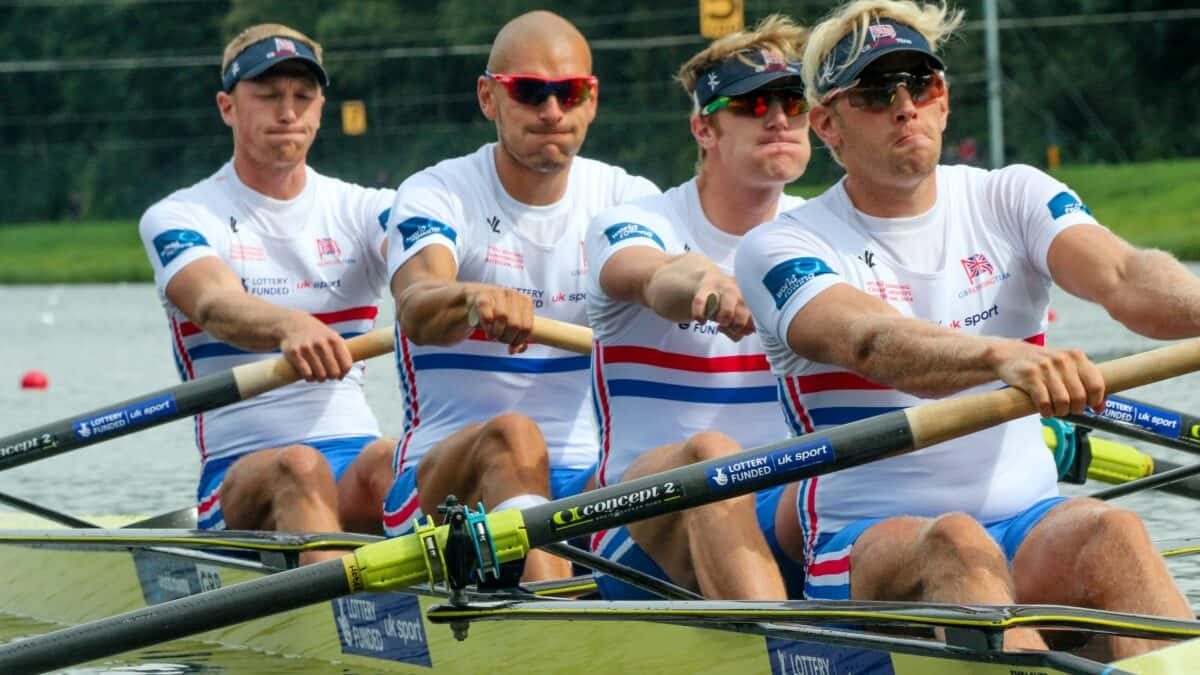
12 Dec 2014
Great Britain’s favourite: the men’s four
World Rowing continues its 2014 review with the men’s four.
Great Britain has had the most success historically. With names like Redgrave, Pinsent and Cracknell, British rowers have a legacy to live up to and a reputation to defend. Great Britain became Olympic Champions in the men’s four at the past four Olympic Games and have overall eight World Championship titles to their name from this boat class.
Andrew Triggs Hodge has been the most consistent member of Great Britain’s current line-up. Having joined in 2005, he has won Olympic gold twice and World Champion gold four times in the four. After Beijing, Triggs Hodge switched to the men’s pair, but a selection decision brought him back into the four after finding that he and partner Pete Reed were unable to beat the Kiwi pair. Triggs Hodge and Reed went back into the four in time for the London Games.
The second longest-standing member of Great Britain’s boat is Alex Gregory. He has been part of the crew since 2009, helping win three World Champion titles and one Olympic gold. Both Triggs Hodge and Gregory went into the men’s eight in 2013 to row to gold at the World Rowing Championships in Chungju, Korea.
Australia has also been a reference in the men’s four. The members of the “Oarsome Foursome” were national stars in the 1990s. Together they won the Olympic Games in Barcelona and in Atlanta and the World Rowing Championships twice. More recently Australia has been the world silver medallists from 2013 and also have Olympic silver in the four from 2012.
At the first World Rowing Cup of the 2014 season, Australia took two medals, gold and bronze. It would take the Aussies until Lucerne to define their permanent line-up for the World Rowing Championships. The crew’s longest serving member came out as Joshua Dunkley-Smith who has been in the boat consistently since 2011. Spencer Turrin and Alexander Lloyd joined last year while Fergus Pragnell, who already had a few stints in the four a number of years ago, came back into the picture this year in time for Lucerne.
[PHOTO src=”117302″ size=”mediumLandscape” align=”right”]
Historically, the United States has also been a constant factor in the men’s four. They have a total of 12 Olympic medals in this boat class. At last year’s World Rowing Championships and at London 2012 the USA won bronze. This year’s combination also proved to be strong and they would seek to better their bronze-medal status.
Great Britain made their first World Rowing Cup appearance this year in Aiguebelette, France. They led the final with Australia and the USA in hot pursuit. The USA stuck behind Great Britain in second position for three quarters of the race, but in the final stretch gave way to Australia who had been following in third.
Lucerne did not turn out to plan for the Australians who were relegated to the B-final. The USA did not race, waiting instead for the World Championships. Instead, it was the 2013 World Champions, the Netherlands, and Canada chasing Great Britain on Lucerne’s Rotsee. Switching between second and third throughout the race, at the line it was the Netherlands in silver and Canada in bronze. “From my seat that was one of the best rows all season,” said Gregory. “Racing is the best training and that was our best one and we are happy to do that here in Lucerne.”
The overall 2014 World Rowing Cup points table was topped by Great Britain with Australia one point behind in second and the Netherlands followed in third.
At the World Rowing Championships in Amsterdam, the Netherlands pushed hard in the final to move up from fourth and try and make it into the medals. But the local crowd’s support proved insufficient to lift the reigning World Champions back onto the podium. The United States and Australia were at it again. Taking possession of second position from the start of the race, the USA held on tight and did not cede to the Australians who moved up from fourth to take bronze. “It was really tough out there but in the second 1,000m we pushed the USA and really dominated,” said Triggs Hodge after the final.
Although many new World Best Times were set in Amsterdam, the men’s four was one of the boat classes that did not establish a new one. Great Britain are the owners of the time set in 2012 at the World Rowing Cup in Lucerne: 5:37.86.
World Rowing Championships, Amsterdam, men’s four final
World Rowing Cup III, Lucerne, men’s four final
World Rowing Cup II, Aiguebelette, men’s four final

